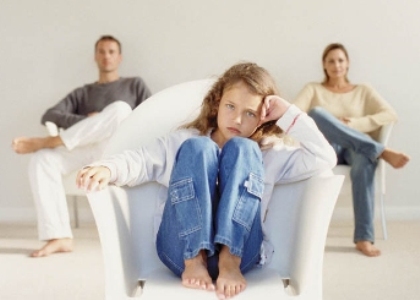As parents, our instinct is to protect our children from harm, to buffer them from life’s challenges and hurts. Divorce can be a difficult experience that tests our abilities as parents to provide our kids with a canopy of safety that keeps at bay the struggles inherent in this major life shift.
Learning from Experience
Parents in intact families may unconsciously run “interference” at times between their child and the other parent. How many kids know which parent will fork over $10 for a movie, or which one is likely to overlook missed chores? But in divorced families, where the differences in values, rules and expectations between parents may be more overt, knowing when to step in and when to keep out of the way of the other parent/child relationship is crucial to our children’s healthy development and maintaining working boundaries between the now “two” family systems. Especially when one or both parents is carrying anger or hurt from the ended marriage, it can be easy to step in to “rescue” a child from what we perceive is unhealthy or damaging behavior on the part of the other parent. But short of our child experiencing physical or severe emotional harm from the interaction, we serve both systems best by letting the participants work out the interaction organically. All children, whether young or older, in intact or divorced families, need to develop individual relationships with each parent devoid of influence from the other parent.
Children need to learn who each of their parents truly are, and this best happens when dynamics are shaped by only the child and parent actually involved. I regularly remind clients that, if their ex is truly a selfish or narcissistic or unreasonable personality (or, conversely, generous, forgiving and flexible) the client needs to have faith in their child’s ability to learn who the parent is through direct experience. We may think we are protecting our kids from our ex’s bad habits, but those “habits” are part of who the other parent IS, and our kids need to learn that their parents are real people, with faults and flaws and sometimes poor choices in their backgrounds. Seeing their parents as “real” allows kids to give themselves grace when they falter themselves. And the sooner children can know who their parents are authentically, the sooner a genuine and mutual relationship can develop. Again, if a parent is physically abusive or verbally attacking or shaming our child, we need to advocate for the child’s safety. But in most cases, parents need to step back and let the child learn how to navigate the relationship with the parent in this new incarnation. Our kids need our protection, but they also need us to believe in their ability to discern who others are, their motivations and quirks and characters. Sometimes we do need to give them shelter, but much more often, our task as parents is to encourage our children to fly.


